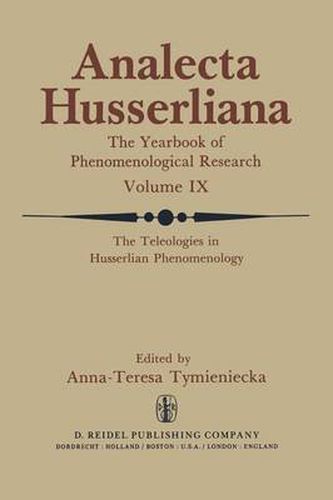Readings Newsletter
Become a Readings Member to make your shopping experience even easier.
Sign in or sign up for free!
You’re not far away from qualifying for FREE standard shipping within Australia
You’ve qualified for FREE standard shipping within Australia
The cart is loading…






This title is printed to order. This book may have been self-published. If so, we cannot guarantee the quality of the content. In the main most books will have gone through the editing process however some may not. We therefore suggest that you be aware of this before ordering this book. If in doubt check either the author or publisher’s details as we are unable to accept any returns unless they are faulty. Please contact us if you have any questions.
The following bibliography, arranged chronologically, permits the reader to follow the development of phenomenological studies in Italy in parallel with other, contemporary, cultural currents. From this list it can be seen that knowledge of Hussed’s work begins in 1923 with the studies of A. Banfi. Phenomenology, however, did not immediately receive a warm welcome. It contrasted with the then dominant neo-idealism (as has been made clear by G. De Ruggiero), but for this very reason it also found adherents among the opponents of idealism. These were either distant heirs of positivism, who accepted Hussed on account of his scientific approach and rigor, or Christian oriented thinkers, who, following an initial period of diffidence toward the antimetaphysical attitude of phenomenological analysis, gradually began to use this method as an antiidealist instrument - even though the problem remained of Hussed’s own transcendental idealism and the value to be attributed to it. Despite the difficulties encountered on the way, the numerous studies carried out in Italy prior to Wodd War II make it clear that the better known philosophers who have left a mark on Italian culture already had begun to take a discreet interest in phenomenology.
$9.00 standard shipping within Australia
FREE standard shipping within Australia for orders over $100.00
Express & International shipping calculated at checkout
This title is printed to order. This book may have been self-published. If so, we cannot guarantee the quality of the content. In the main most books will have gone through the editing process however some may not. We therefore suggest that you be aware of this before ordering this book. If in doubt check either the author or publisher’s details as we are unable to accept any returns unless they are faulty. Please contact us if you have any questions.
The following bibliography, arranged chronologically, permits the reader to follow the development of phenomenological studies in Italy in parallel with other, contemporary, cultural currents. From this list it can be seen that knowledge of Hussed’s work begins in 1923 with the studies of A. Banfi. Phenomenology, however, did not immediately receive a warm welcome. It contrasted with the then dominant neo-idealism (as has been made clear by G. De Ruggiero), but for this very reason it also found adherents among the opponents of idealism. These were either distant heirs of positivism, who accepted Hussed on account of his scientific approach and rigor, or Christian oriented thinkers, who, following an initial period of diffidence toward the antimetaphysical attitude of phenomenological analysis, gradually began to use this method as an antiidealist instrument - even though the problem remained of Hussed’s own transcendental idealism and the value to be attributed to it. Despite the difficulties encountered on the way, the numerous studies carried out in Italy prior to Wodd War II make it clear that the better known philosophers who have left a mark on Italian culture already had begun to take a discreet interest in phenomenology.